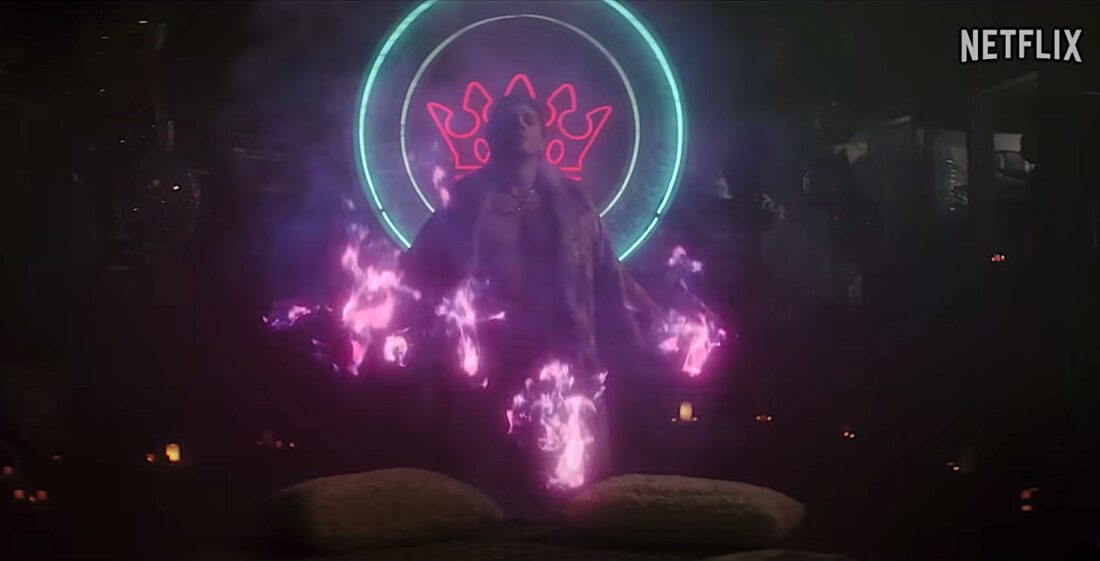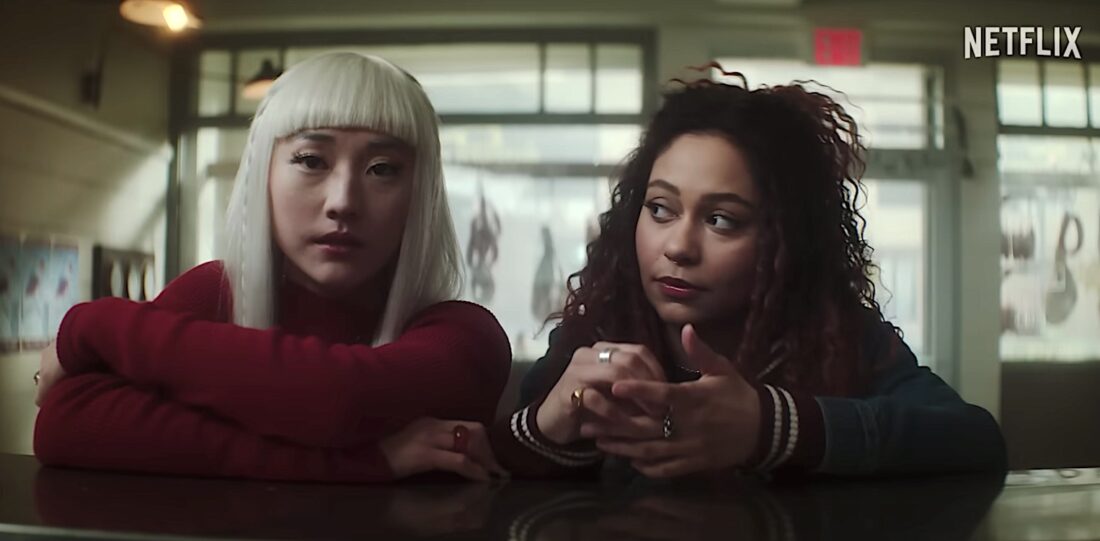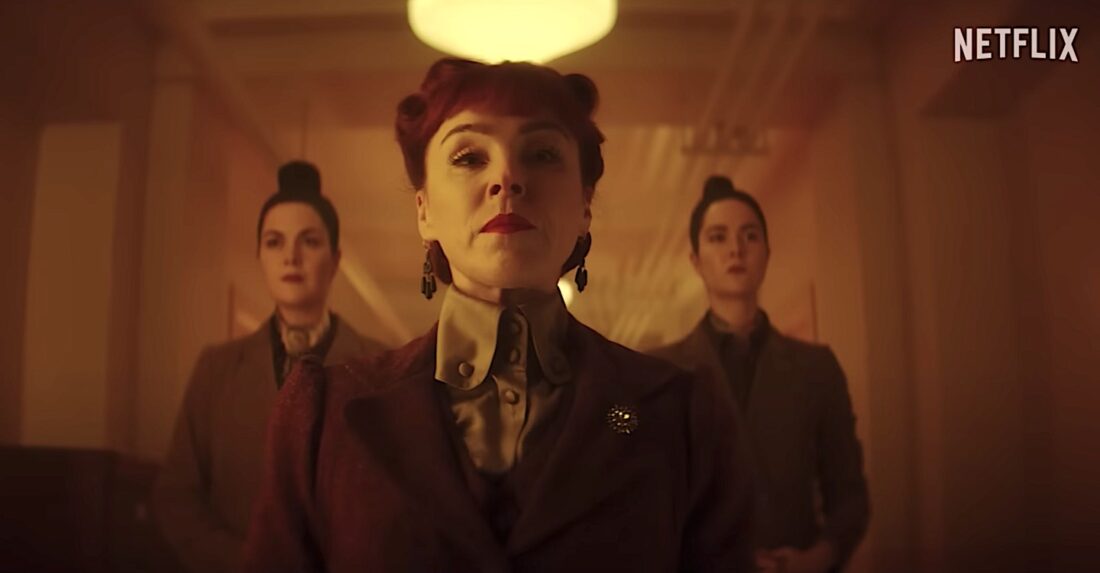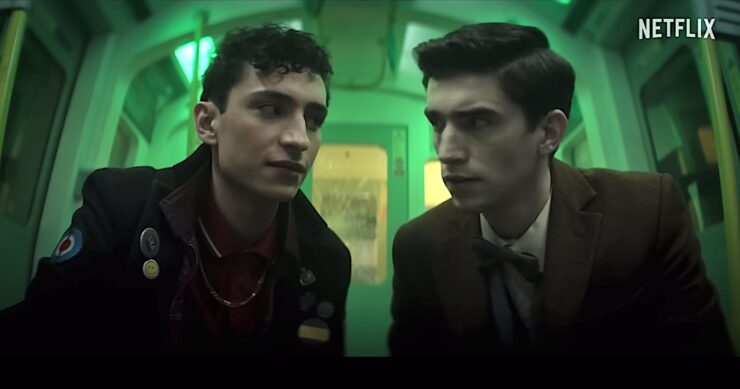Let me start by saying that Dead Boy Detectives is often delightful—but that I also don’t think it’s exactly for me. The Sandman is for me. Season One of American Gods was VERY MUCH for me. I think Dead Boy Detectives is for who I might be if I was in high school now, and that makes me incredibly happy. Grateful, actually, that this kind of show can be there for kids now, and be so fun and weird and queer.
The show was developed by Steve Yockey, who acts as co-showrunner with Beth Schwartz. On #TeamDeadBoy, George Rexstrew plays stuffy Edwardian Edwin Payne, Jayden Revri plays late-80s punk Charles Rowland, Kassius Nelson plays teen psychic Crystal Palace, Yuyu Kitamura plays Crystal’s neighbor-turned-friend Niko, and Briana Cuoco plays their furious goth landlord, Jenny, who is also the town’s butcher. On the villainous side of the aisle are Jenn Lyon as a centuries-old witch named Esther, and Ruth Connell as an afterlife bureaucrat who thinks the Boys should be less “detectives” and more plain old “dead”. And then there are fabulous ghost clients, town denizens, high school students, demons, a Cat King—everyone’s pretty great. My personal fave is Michal Beach as Tragic Mick, proprietor of Tragic Mick’s Magic Tricks, who used to be a proud walrus before a curse trapped him on land. I want the Tragic Mick spinoff NOW. And, obviously, I have to give a special nod to Lukas Gage who steals the whole show as the Cat King (until Edwin gets his shit together and stands up to him, anyway) and whom I also found delightful in a very different role in the Road House reboot.

The Dead Boy Detectives began life (heh) as minor characters in what was, for my money, the best arc of Neil Gaiman’s Sandman, “Season of Mist”. That’s the one where Lucifer quits his job, and Hell falls into chaos while various entities fight over who’s going to rule it next. (<GrouchoVoice>It’s been on my mind a lot because it’s an election year here in the US. </GrouchoVoice>) Little Charles Rowland is the last living student at his boarding school, and when it’s overrun by demons and ghost teachers, little Edwin Payne, who died in 1916, helps him navigate all the horror. When Death comes to collect them, the two decide to stay on Earth (and eventually go into business as afterlife detectives) and she lets them because she’s incredibly busy. In the comic it’s a dark take on a classic boarding school story, it’s really sad and horrific under the black humor, and the boys are both around 12 years old.
Neil Gaiman loved the characters and the concept, and brought them back for a Children’s Crusade crossover comics event, Jill Thompson adapted their story for Death: At Death’s Door, they got a four-issue miniseries called Sandman Presents: Dead Boy Detectives from Ed Brubaker and Bryan Talbot. and most recently, two appeared on Doom Patrol, where they were aged up a little and played by Sebastian Croft and Ty Tennant. In the new iteration, the boys are sixteen—I’m assuming for romantic spark reasons—but I guess the title Dead Teen Detectives doesn’t really roll off the tongue. The boys have both come into clearer focus: Edwin Payne died in 1916 rather than 1914, and Charles Rowland died sometime in the late 1980s I think—both deaths the result of attacks by fellow students, but in both cases I think their deaths would be called hate crimes. Edwin is stuffy, snarky, and dressed in perfect Edwardian upper-crust fashion; Charles is as punk as a boarding school uniform will allow, with a mohawk-adjacent haircut, an earring, and a jacket bristling with buttons for ska bands and Union Jack patches, and he radiates happiness and optimism.
Obviously, these facades get chipped away as the series rolls along
The Boys have three antagonists of differing levels of importance: a witch they piss off in the first episode, members of the afterlife bureaucracy who want to separate them and sort them into their “proper places”, and, of course, Death Herself—though I suspect Death isn’t the antagonist they think she is.
We quickly learn that the boys have been working together since Charles’ death, and have racked up an impressive roster of solved cases over almost 30 years. But it’s always been just the two of them, until a botched exorcism leaves them with a traumatized psychic teen named Crystal Palace, who in turn leads them to a case in America that entangles them with a troubled student named Niko, their lonely landlord, a truly heinous witch, and the Cat King of Port Townsend, Washington.

Much like The Sandman, the ensemble grows a bit in each episode, until each new member feels vital to the show. Each episode is named for the week’s case, and one of the strongest parts of the show is the Case of the Week format. The larger concern always tie-in to the cases. “The Case of The Dandelion Shrine” brings Niko into the group, “The Case of the Devlin House” helps unravel a little of Charles’ past, “The Case of the Two Dead Dragons” brings up some of Crystal’s past with David, her Demon—but each case stands on its own merits as well.
Also like The Sandman, the show is dark fantasy edging into horror. I would argue that the horror is a lighter and more kid-friendly than the other Gaiman adaptations, but as ever it depends on the kid. And there is a trip to Hell, and somehow even more discussions of death and its complications than you’d expect from a show about ghosts. And yes, two members of the Endless do make appearances—one is pretty obvious, but I was startled by which other Endless the show’s writers chose to feature. As much as I’m talking about DBD as a fun, cute time, there are some really dark undercurrents here.
Where the Netflix adaptation of The Sandman felt like The Sandman, and sometimes stuck too close to the source material, Dead Boy Detectvies is freewheeling, and throws dashes of Pushing Daisies, Buffy, modern Doctor Who, and Riverdale into the core Gaiman-ness, and, happily, reaches beyond all of those core influences to create its own tone. Best of all, to me, is that the show as a whole acts as a weird, queer, outsider rallying cry against despair. Why should the Boys submit to the afterlife status quo, just because it’s expected? Why should they create an afterlife that suits them, and helps people both living and dead?
As I said, I especially loved the episodes that made the Case of the Week the focus, and poked at the overarching themes in a way that was in service of the case. The best example would be “The Case of the Devlin House”, where Edwin, Charles, and Crystal investigate a haunted house. The haunted house turns out to be kind of a supernatural cold case, and, for reasons I shall not spoil, ties in incredibly well with Charles’ ongoing struggles with trauma and anger. The episode comes together extremely well, and feels inevitable rather than overdetermined, and also features a genuinely scary monster and a creative use of VHS tapes. As the credits came up I realized that it was damn close to the X-Files high I’ve been chasing most of my adulthood. (Also a fun dovetail with seeing I Saw the TV Glow, another incredible work of queer horror, with my beloved colleague Emmet a few weeks ago.)

The villains are two variations on the Bitchy Authority Figure. Ruth Connell and Jenn Lyons both do fabulous jobs playing iterations of this character, with Connell making Night Nurse a Schoolmarmish Afterlife Authority Who Wants Everyone To Go To Their “Proper” Place, and Lyons having fun with the Condescending Witch Who Wants To Be Young Forever—they felt like riffs on villains we’ve seen in Buffy and Doctor Who, but they both get actual characters arcs, and become more than archetypes. Thematically they work perfectly—Edwin, who seems upper-class but is also a gay nerd, and Charles, who is biracial and sticks up for outsiders in his oppressive boarding school, are both boys who challenge the idea that anyone has a proper place, and making their antagonist a bureaucrat who “just follows orders” is a great idea—though I do think she needed a little more development for their antagonism to pay off better. Making the Boys’ other antagonist a literal child predator was perfect—but I wish there had been a little less emphasis on her, because of my one big overall issue, which I’ll get into… now.
I have some quarrels with the structure of the show. For me, personally, the show culminates in Episode 7, “The Case of the Long Staircase”, which made the actual finale, “The Case of the Hungry Snake”, feel a bit overstuffed and frantic. But that also might just be a me thing—I loved the themes that were explored in Episode 7, and felt like the finale was a bit too much… plot. Effective plot, to be clear, and plot that made me want a second season, but after the delicacy and depth of Episode 7 it was a lot to process. (For those who have watched the show, I’m planning a spoiler essay later this month that will go into the themes of Episode 8.) One other thing that plays into this is the show’s habit of telegraphing too many of its emotional beats. A traumatic or pivotal event happens, and before the event has room to breathe, the characters are explaining it, talking about it, underlining it—basically holding the audience’s hand as they navigate it. Several of the episodes follow a pattern where Person A urges Person B to talk about trauma, Person B allows several nudges and then blows up, Person A backs off, and a few minutes later (minutes, not episodes) Person B apologizes for blowing up and talks about trauma to Person A. It would have been much more effective and natural to let these conversations play out across multiple episodes, to leave things unsaid, to allow the gentle prods and subsequent blow-ups to play out over a few weeks in the show’s world so that the audience could feel move involved. And again this is by no means a dealbreaker for me, just one area where I think the writers can trust their audience to come with them, rather than having to spoonfeed anything, and I really hope that if we get a second season the writers allow the characters their space.
You might have noticed, if you read other reviews of mine on this site, that I’ve used some variation on the words “joyfully queer” or gleefully queer” a lot lately—because there’s been a beautiful lava flow of fucking rainbow Skittles in pop culture. And please understand that I don’t mean that it’s all been cheerful—The People’s Joker, I Saw the TV Glow, Interview with the Vampire, Good Omens, and Dead Boy Detectives are not exactly chipper fare. But they are all honest about queer experience. They give no quarter and no credence to the straight world’s opinions. THAT’S where the joy comes in. This makes me incredibly happy, and also worried, because so much of the world is attempting to crush this latest wave of queer joy, but also hopeful, because I think the kids coming up after me are much stronger than I was—and I was goddamn strong.
Dead Boy Detectives features some completely matter-of-fact queerness of a kind that would have been revolutionary only a few years ago, and has a slightly more complicated plot centered on Edwin, who grew up in a time when being open meant imprisonment and probably death. (Edwin was born the year Oscar Wilde died, after all.) The nimble balance of these threads is one of the great joys of the show, among a lot of joys.










